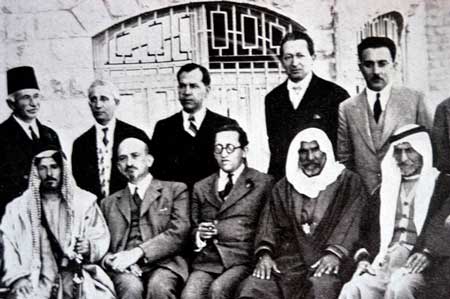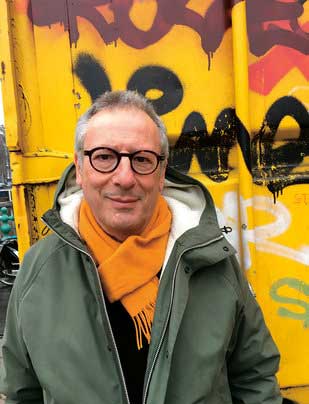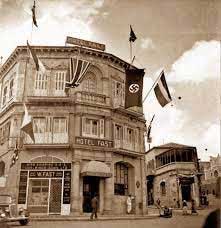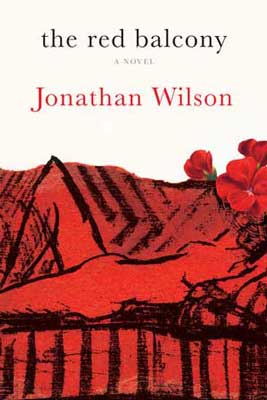Interview
With Jonathan Wilson
Author of The Red Balcony
Jonathan Wilson will be reading from The Red Balcony at the following times and locations:
Tuesday, February 21, 7:00 PM ET, Porter Square Books, Cambridge, MA, in conversation with Ravit Reichman.
Tuesday, February 28, 7:00 PM ET, Newtonville Books, Newton, MA.
Thursday, March 2, 7:00PM ET, McNally Jackson Seaport, New York, NY, iIn conversation with Molly Antopol.
Sunday, March 5, 5:00 PM ET, Politics and Prose (at Conn Ave), Washington, D.C., in conversation with Matthew Davis.
Saturday, April 15, 3:00 PM ET, The Bookstore, Lenox, MA.
Interview with Jonathan Wilson, February 6, 2023, edited and redacted
CM (Charles Munitz): I am curious about your approach to fiction. It seems that you use historical settings for your novels, three of them set during different eras in Mandatory Palestine, but they are written as thrillers and romantic novels as well. What motivates you to write in the way you do?
JW (Jonathan Wilson): It’s true that I’ve written three novels in which history and fiction are merged. It’s a genre that appeals to me and allows me to explore certain nuances of character that I wouldn’t be able to explore if they were simply historical. I’m not an historian of the Mandate period but I think what motivates me to merge the two is that I get to both tell a story based on actual historical events but also to explore more deeply the sort of characterological issues like the questions of identity that are an extension of things that I grappled with myself growing up Jewish in England and living in Israel for awhile then moving to America. I also want to tell a story that will grip and I hope excite readers. I should also say that I’ve written two books of short stories and I have a third that I’m working on now and they’re very different from the historical novels; they’re very contemporary and they don’t merge historical figures in the same way. They tend to be in some ways lighter, although, I hope, carrying a kind of sting at their ends. So I like to write in a lot of different ways. What motivates me to do that? I can’t really say. I’ve written a memoir, I’ve written a biography. So I like to move in in many different forms and I regard it as all of a piece.
CM: Speak a little more about what you just touched on about the characterological question, especially as exemplified in The Red Balcony through the character of Ivor and how that touches on your own sense of identity. [Ivor is the main character in The Red Balcony and is a young British Jewish barrister who has come to Palestine to offer services in the murder case at the center of the story. – Ed.]
JW: Like Ivor, I am a British Jew who grew up quite comfortably in England, though not necessarily in the material sense. I did go to Oxford as a graduate student, as did he, and I know something of the place, though his experience was much earlier on, since the novel is set in 1933-1934. Ivor has no particular interest in Jewish life in Palestine. He’s not an immigrant; he’s there for an adventure really. He’s experienced some sort of knee-jerk anti-Semitism in England as he describes it, though nobody stopped him from going to Oxford. His father has had a very distinguished career as a barrister. So, when he gets to Palestine he feels more English than he does Jewish to a degree, so his feelings and his affiliations shift. I based that partly on my own experience. When I was growing up in England, I came from an observant Jewish family. Although I ceased to be observant in my teens, I certainly felt that being Jewish was always the foregrounded aspect of my personality, and I certainly felt the sting of that kind of knee-jerk antisemitism that was everpresent. But again, it didn’t prevent me from living my life and going to college and having a pretty successful time academically. When in 1977 I moved to Israel where I lived for four years while teaching at the Hebrew University of Jerusalem, I found that the English side of my personality was something I had taken for granted in England and so there was a kind of seismic shift in how I had to look at myself. When I first went to New York City, I felt like I had never really seen Jewish people having fun before, which I think came from a certain level of comfort that derived from being a very large segment of the population. In England, Jews represented a quite self-effacing minority. So I felt a certain liberation in New York City. It was like, so, I was Jewish – no big deal, whereas in England it was always a big deal. So, I pasted some of those elements of my own experience on to Ivor, but not all of them. He is, of course, fictionalized, and his personality is quite different from mine, but those issues of identity and loyalty and affiliation were part of my own experience as well.
CM: Was your move to Israel in 1977 conceived as making Aliyah, were you just trying out the waters, or were you simply moving to an academic position? [Making Aliyah, for those who might not know, is the term that designates the intention to undertake a permanent move to Israel. – Ed.]
JW: I had first gone to Israel, like so many of my peers, in the summer of 1968, a year after the Six-Day War, to work on a kibbutz, and had been back and forth after that a few times, including arriving during the Yom Kippur War and leaving couple of months afterwards. Though I did go back and forth several times, I never really contemplated moving there to live. When I was at Oxford, I had met a poet with whom I worked on a Penguin anthology of Hebrew verse. He told me about an opening for a job in the English Department at the Hebrew University to which I applied and for which I got an offer, so I moved there. I think the visa I received said that I was to be called a Visiting Foreign Expert though I was an expert in absolutely nothing. In a sense I was just living in Jerusalem as if I might have have been living in Paris or any other city where I had got a job. During that four year period I was indeed very happy to meet the woman who would become my wife, an American studying at the Bezalel Art School in Jerusalem.
CM: The epigraph of The Red Balcony is pretty interesting: To understand historical reality it is sometimes necessary not to know the outcome. How does that inform this novel?
JW: The novel is about a case that after 90 years remains unsolved. I tried not to go into writing the novel with any preconceived notions about solving the solving the murder. As the saying goes, the job of the novelist is not to solve any problems, but only to present them as clearly as possible. I do see in the British Mandate period so many of the roots of the continuing conflict in the Middle East and I often feel that when we’re talking about that region we don’t look back far enough to really understand the origins of the problems. Certainly around the Arlosoroff murder there were significant schisms between different factions of Jews, and of course between Jews and Arabs. When I first went to Israel in 1968, I would not have had any idea that things would turn out the way they have turned out at the present time. So when you’re writing a work of fiction that may grapple with these complex issues, you don’t want to come in with fixed ideas about how things are going to go in the future. I also think, in terms of writing historical fiction, you have to be very careful not to have characters think in a way which includes knowledge of what comes later; ao the characters themselves are in a situation in which they don’t know how things are going to go. There are all these competing narratives and competing factions, and it’s the uncertainty created by those that I wanted represent in the story.
CM: Speak a bit more about the various factions you identify. There’s the character of Charles Gross who is very different from Ivor in that he’s a follower of Jabotinsky, and you speak about his unabashed contempt for Ben-Gurion. [David Ben-Gurion was a leader of the Labor Zionists, considerably more to the left than the Revisionists who followed Jabotinsky. – Ed.] Apart from the Labor Zionists and the Revisionists you also allude to the cultural Jews who were in Palestine at the time. How do you see this contrasts of Jewish affiliations portrayed in the novel playing out in contemporary Israel?

with Chaim Weizmann (to his left)
at a meeting with Arab and Jewish leaders
arranged by Arlosoroff, Jerusalem, April 1933
JW: I try to represent in the novel the competing narratives that were already in place in the nineteen thirties. I also did this in my earlier novel The Palestine Affair (2007) set in the 1920s. In both cases, the plot is built around political assassinations that actually took place. In Charles Gross you have a character who is indeed aligned with the Revisionists under Jabotinsky and who indeed has contempt for the Labor Zionists. Much of that stance continues to the present day as the political right continues to have that kind of outlook cemented in place; it’s been there for ninety years and is perhaps even more powerfully expressed in the present situation. The movement of cultural Jews was exemplified by someone like the scholar Gershom Scholem [a famous scholar of Jewish mysticism who emigrated to Israel from Germany – Ed.] which played an important part earlier on but which now has, as a movement, completely faded from the mainstream in Israeli life. The political left of course is very much diminished from what it was. We know from the most recent election that the political right is moving towards the ascendancy. And I don’t think anybody could have predicted back in 1930 what the impact of the religious right in Israel would be today. In 1968, the Labor Zionists and secular Jews were much more powerful than now and it seemed at the time that the country that emerged from that would move in a different direction. In the novel, I tried to include characters who represented all these various and different point of points of view that later emerged as influential in one way or another.
CM: Where, by the way, does the title The Red Balcony come from?
JW: Tsiona lives in Jerusalem and has a balcony which is overhung by a plum tree with red plums and has red flowers growing in window boxes around it. [Tsiona is an artist, plays a romantic lead, and seems to have evidence relevant to the case. – Ed.]
CM: Tsiona is an incredibly magnetic character. What makes her so central in the novel?
JW: There are a number of reasons. She’s a representative of the kind of new Jewish woman in Palestine: she secular, she’s independent. And yes, she’s a magnetic personality and extraordinarily attractive and Ivor falls in love with her. She’s also represents another kind of world to him, a Bohemian world of artists and poets and musicians that we easily forget existed there at the time. We tend to focus so powerfully on the political in that we tend to forget that there was also this flowering of artistic culture. We also find her intriguing because we don’t know exactly where she stands. One doesn’t know whether she is central to the plot or she peripheral to it. Is what she’s seen absolutely vital to the case or does it not matter? She certainly turns Ivor inside out, but she also has this perhaps significant role in the plot.
CM: In the book, there’s the implication that both of the accused, Stavsky and Rosenblatt were let off, but I gather that one of them was actually jailed.
JW: We do know that the guilty verdict plea was overturned on appeal. In the novel, a character says if the trial had been in England, they would have both been found guilty, but actually they were let off on a technicality. So, though a little jail time was spent, no one was ultimately convicted.
CM: What was the political or judicial set up for the accusation of these Revisionists, Stavsky and Rosenblatt? And then there was the complication of a couple of Arabs theoretically confessing at the last minute.

Photo: © Sharon Kaitz
JW: In the novel there’s a certain ambiguity in the testimony of Arlosoroff’s wife. I didn’t make any of this stuff up, but she did say that precisely those things that I said she said. She did, at different times, say it was Arabs who were responsible for the murder but then switched to the Revisionist Jews. The majority thinking among Jews at the time was on the political left, but, in addition to that, there was also quite a bit of evidence to suggest that in fact the Revisionists were implicated. I could have gone into every detail of the historical reality, but it would have overly complicated things to do that. But indeed there were incredibly vituperative assaults from the right. Arlosoroff was under attack from right-wing newspapers for doing this deal with Nazi Germany. But it was a deal that was of course, approved by Ben-Gurion and the Labor Zionists who were in the majority. I did read a great deal of the transcripts of the trial and there’s quite considerable evidence against Stavsky and Rosenblatt. But the bizarre confession and retraction by the Arabs is also historically accurate.
CM: It seems as though the Arabs were already jailed and there was some kind of internal dealing that was offering them something in exchange for their confession.
JW: Yes, apparently the judge threw it out because it appeared the Arabs had been bribed to confess.
CM: An historical element that you don’t seem to pursue in the novel is that Arlosoroff was rumored to have been romantically involved with a German woman named Magda who later married Nazi leader Joseph Goebbels.
JW: I left it out because it’s never been conclusively shown. It’s quite possible that they were just school friends. I thought it more rumor than facts, so I didn’t want to mess with that.
CM: On the other hand, it seems like such an obvious motive for Alosoroff’s murder if there were any truth or any persuasive power at all.
JW: Of course, you’re right, and an idea that people like to play with, but I never read anything that really persuaded me that it was the case.
CM: It was the case that for some number of months the Nazi flag flew over a building in Jerusalem, a consulate or something?

JW: No, it was a hotel in Jerusalem, Hotel Fast. Seeing that photo was really one of the catalysts for the novel. I had seen this extraordinary photograph of the Hotel Fast which appears in the novel, which I remember from when I first moved to Jerusalem had actually become a Barclay’s Bank. Hotel Fast was a hotel that had attracted German tourists to the Holy Land. The hotel had flown the old German flag, but after Hitler he came to power in 1933, both the old German flag and the flag with the swastika were operative, and the hotel put up the swastika next to the Union Jack. The British weren’t at war with Germany in 1933 and it was just it was just the German flag, though it’s shocking and chilling to see this hotel with the swastika flag proudly waving over the streets of West Jerusalem.
CM: So, Arlosoroff worked out this deal with the Nazis to release Jews to Palestine? Had he worked on it with the British Mandate? [The Ha’avara agreement – Ed.]
JW: It was rubber-stamped by the British authorities.
CM: And, as I recall, something like 30,000 Jews came from Germany to Palestine as a result?
JW: It was over 50,000 and they were all from Germany.
CM: And that was in 1933. And then what dashed the deal ultimately? You refer in the novel to the flag coming down.
JW: I don’t know exactly, but the deal was limited and once the Nazi war machine really started to ramp up, there weren’t going to be any more dealings.
CM: It is fascinating that there had been this arrangement at all.
JW: It was so controversial because it not only helped the Jews, but it also helped the German economy.
CM: There was a boycott of German goods going on, right?
JW: Yes. Right.
CM: And who was boycotting them at the time?
JW: Mostly Jews from the United States.
CM: You’ve written these three novels set at different times in the early history of Palestine. The Palestine Affair is set in the 1920s. And the other is The Hiding Room.
JW: That is set during World War Two.
CM: How are you seeing things that are going on in Israel now?
JW: Like almost all of my Israeli friends, I am deeply disturbed. The capitulation to the extreme right is just extraordinary.
CM: Do you have any thoughts about any possible political resolutions? Do you continue to support the two-state solution at this point in time?
JW: I do support it. But when I was living in Israel, Sadat came to visit and It seemed a moment of extraordinary hope. And one’s hope has been just repeatedly dashed and recently to have as the Minister of National Security Itamar Ben-Gvir who had a picture of Baruch Goldstein up on his wall is just beyond disturbing. [In 1994, Baruch Goldstein perpetrated a terrorist attack on a mosque in the Palestinian city of Hebron. – Ed.]
CM: You were head of the English Department at Tufts University for a long time. Is that right?
JW: Yes. And the founding director of The Center for the Humanities at Tufts.
CM: And you are Emeritus now.
JW: Yes, I’ve been retired for two years.
CM: You are a serious soccer fan and have written a memoir about soccer Kick and Run (2013). Isn’t there another Jonathan Wilson who writes about soccer?
JW: Yes, and he is much much more famous than I am, though I do get a lot of emails meant for him. I’ve occasionally appeared in in the same soccer magazines as the other Jonathan Wilson, confusing everyone, though I’m only an occasional soccer writer; he, on the other hand, is a full-timer.
– BADMan (aka Charles Munitz)

Leave a Reply